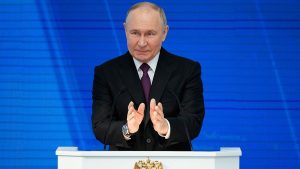Russia Uses Vacuum Bombs After Ukraine Attacks Kursk
In a shocking turn of events, Russia has resorted to using vacuum bombs, also known as thermobaric weapons, in response to a bold incursion by Ukrainian forces into the Kursk region. This marks a significant escalation in the ongoing conflict, which has already seen substantial military engagement since the full-scale invasion began in February 2022. The use of such devastating weaponry raises serious ethical and humanitarian concerns, particularly given its capacity to cause catastrophic destruction and loss of life.
The recent Ukrainian attack on Kursk, described as the largest cross-border operation since the war began, caught Russian forces off guard. Reports indicate that Ukrainian troops advanced as deep as 12 miles into Russian territory, prompting an immediate and fierce reaction from Moscow. The Russian Defense Ministry confirmed that airstrikes were conducted against Ukrainian positions, including the deployment of vacuum bombs capable of vaporizing human bodies due to their intense blast waves and subsequent vacuum effects that suffocate targets.
This military strategy reflects a desperate attempt by Russia to regain control and demonstrate its military capabilities in the face of Ukrainian advances. The Kremlin has labeled its response a “counter-terrorism operation,” which includes measures to tighten security in the Kursk, Belgorod, and Bryansk regions. These measures allow for the relocation of residents, control over communications, and requisitioning of vehicles, indicating a state of heightened alert and mobilization of resources.
The implications of using vacuum bombs are profound. These weapons create a powerful blast wave followed by a vacuum that can displace air and cause severe injuries or fatalities to anyone in the vicinity. While the use of vacuum bombs is not explicitly prohibited under international law, their application in civilian areas or against non-combatants raises significant legal and moral questions. Reports of their deployment in previous conflicts have drawn widespread condemnation from human rights organizations and governments alike, emphasizing the need for adherence to international humanitarian standards.
As the conflict escalates, the international community watches closely. The Ukrainian government has remained relatively silent on the specifics of their recent operations, leading to speculation about their strategic objectives. Analysts suggest that the incursion may be aimed at disrupting Russian supply lines and asserting Ukraine’s military capabilities, a move that could bolster morale and support both domestically and internationally.
In neighboring Belarus, where Russian troops are stationed, President Alexander Lukashenko has expressed confusion over Ukraine’s motives, warning that any provocations would not go unanswered. This rhetoric underscores the potential for the conflict to spill over into other regions, further complicating an already volatile situation.
Recent airstrikes by Russian forces have not only targeted military installations but have also resulted in civilian casualties. A missile strike on a shopping mall in Kostiantynivka, Ukraine, killed at least 14 people and injured dozens more, highlighting the indiscriminate nature of the conflict and the urgent need for ceasefire negotiations. The United Nations has reported a significant increase in civilian casualties in recent months, with July alone seeing over 200 deaths attributed to conflict-related violence.
The use of vacuum bombs, coupled with the ongoing military operations, paints a grim picture of the current state of affairs in the region. As both sides prepare for further confrontations, the potential for escalation remains high. The international community must grapple with the implications of these developments, particularly regarding humanitarian assistance and the protection of civilians caught in the crossfire.
In conclusion, the deployment of vacuum bombs by Russia in response to the Ukrainian incursion into Kursk signifies a dangerous escalation in the conflict. As both sides brace for continued military engagement, the humanitarian impact of such weaponry cannot be overstated. The world watches with bated breath, hoping for a resolution that prioritizes peace and the protection of innocent lives amidst the chaos of war.


